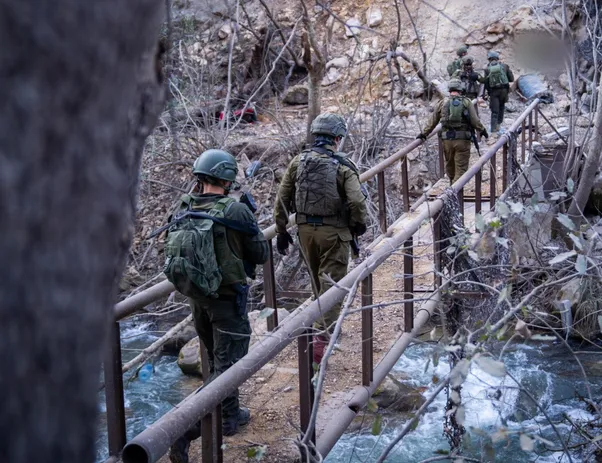The US-mediated ceasefire in Lebanon, supported by France, between Israel and the Iran-backed Hezbollah entered into force at 04:00 on Wednesday morning after nearly 14 months of cross-border hostilities that had intensified in the two last months.
On Tuesday evening, the Israeli Security Cabinet formally approved the US proposal for the ceasefire arrangements in a 10-1 vote. The sole cabinet member to vote against the deal was Itamar Ben Gvir, the most far-right extremist member of the Israeli coalition government but he did not threaten to break up the government. EU has considered putting him on its sanctions list.
In Lebanon, the government still has to formally approve the agreement on Wednesday morning. On Tuesday evening a senior Hezbollah official said that the militia wanted to review the ceasefire deal but it is widely believed that it will accept it after Iran announced that it supports it. After heavy losses but holding its ground, Hezbollah will frame the ceasefire deal as a victory.
Heavy Israeli strikes against Hezbollah targets in Lebanon and Hezbollah rocket fire against northern Israel continued until the last day before the cease-fire. In Israel no alarm signals were heard in the four hours before the ceasefire entered into force.
Streams of cars with displaced Lebanese citizens have already been seen heading toward southern Lebanon but both the Arabic-speaking Israeli army spokesperson and the Lebanese army have warned them that it is not yet safe there and too early to return.
On the Israeli side of the border, there is no hurry to return to the towns and villages that were evacuated during the war. The displaced Israeli citizens and their local mayors have protested against the ceasefire agreement and fear that without a buffer zone in southern Lebanon it will not be safe for them to live close to the border.
A tense and temporary ceasefire
The details of the agreement have not yet been published but reflect what has been reported previously in media. It is not a peace agreement between Israel and Lebanon but a 60-day ceasefire deal which is expected to lead to a permanent end of the hostilities between the two countries.
During the ceasefire period, Hezbollah will withdraw completely to the Litani river 30 km north of the border. The Lebanese government army will be deployed to this area. Simultaneously the Israeli troops, that reached the Litani river during the last days of the fighting, will withdraw from southern Lebanon.
In a speech on Israeli TV before the formal cabinet approval, Prime Minister Benjamin Netanyahu did his best to convince the Israeli public and his voter base that the agreement was the best possible and reflected a strategy to deal with each front in a multi-front conflict with Iran and its proxies separately.
"Hezbollah decided to attack us from Lebanon on 8 October. A year later, it is not the same Hezbollah. We have pushed them decades back. I have said many times, a good deal is a deal that is enforced, and we will enforce it," he concluded. "With the full understanding of the US, we maintain full freedom of military action. If Hezbollah violates the agreement and tries to arm itself, we will attack. If it tries to rebuild terrorist infrastructure near the border, we will attack. If it launches a rocket, if it digs a tunnel, if it brings in a truck carrying rockets, we will attack.”
There is no mention of any international force on the ground to supervise and enforce the ceasefire but a US-led mechanism, with the full support of France and other allies, has pledged to work with Lebanon and Israel to secure that the arrangements are fully implemented, US President Joe Biden announced immediately after the Israeli decision.
First Lebanon, then Gaza
In his speech, Biden put squarely the responsibility for the war on Hezbollah. “Israel did not launch the war, nor did the Lebanese people seek war.” The ceasefire agreement is designed to lead to a permanent cessation of the hostilities, enable the displaced citizens on both sides of the border to return home, bring security to Israel and in the long term restore Lebanon’s independence.
He confirmed that in case of a breach of the agreement by Hezbollah, Israel retains “the right to self-defence consistent with international law like any other country facing a terrorist group pledged to that country’s destruction”.
Although Netanyahu is intent on continuing the war in Gaza, pressured by his extremist coalition partners, it is believed that the ceasefire in Lebanon can revive the talks on a ceasefire-hostage deal and end the war there.
In his speech, Biden said that the people in Gaza have suffered far too much far too long and also deserves an end to the fighting and displacement. Over the coming days, the US will make another push with Turkey, Egypt and Qatar to achieve a ceasefire in Gaza. He also foresaw a future where the Palestinian people have a state of their own which fulfils its legitimate aspirations. “Peace is possible”.
The Brussels Times reached out to the European External Action Service (EEAS) for a comment but it had not published any statement at the time of publishing this article. Josep Borrell, together with Belgian foreign minister Hadja Lahbib, will open a second follow-up meeting in Brussels on Thursday of the Global Alliance for the Implementation of the Two-State Solution, co-hosted by the EU and Belgium.

